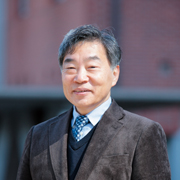Faculty of Economics
Department of Economics
Department of Business Administration
Department of International Business
Faculty introduction

The Faculty of Economics is made of up the three departments of Economics, Business Administration, and International Business. The Department of International Business is a new unit that was split off from the Department of Business Administration in 2006, and formed in recognition of the globalization of society. Now, you may wonder what the difference is between economics and business administration. Economics deals with the economic activities of individuals, enterprises, and of society as a whole. The Department of Economics offers many courses that examine economies objectively from the outside using theoretical or historical methods, and these are interesting for how they trace economic movements back to their source. Business administration, on the other hand, does its thinking from a position inside business. The business administration techniques of accounting, marketing, and finance, and theories of organization are among the core interests. Naturally, these two are closely connected, and their courses often overlap. Please take this into consideration when choosing your department.
Atsushi Nishio, Director, Faculty of Economics
Educational Objectives and Human Resource Development Objectives
Economics is an extremely broad field of learning that takes the movements of people, money, and material things as its objects of study. It is a practical science that connects directly to the lives of individuals and of groups. In the Faculty of Economics, the objective of study in every department is first of all to acquire the fundamental skills of the field in question. At the same time, efforts are also devoted to gaining the ability to gather relevant information and to communicate with other people, with the aim of developing talented people who possess a healthy ethical sense together with the knowledge of economics that will fit them to play active roles in society. The department also provides a large number of practical courses in which the foundation skills students have acquired are applied to actual situations so that they will gain the ability to deal flexibly with the diversity of economics and new changes that take place. Our aim is to foster students who, through their learning, acquire a sense of balance and become “economic players with a conscience.”
Educational Objectives and Human Resource Development Objectives
Department of Economics | Department of Business Administration | Department of International Business
Policy on Conferral of Degrees (Diploma Policy)
The Faculty of Economics confers the bachelor of arts degree on students who have spent the specified period of time as registered students, who have acquired the fundamental skills of the particular department in accordance with the Educational Objectives and Human Resource Development Objectives of the Faculty, and who at the same time are “economic players with a conscience” who have also acquired practical competence. In order to receive an academic degree, students must have taken the courses arranged by their respective departments and acquired the required number of credits.
Policy on Conferral of Degrees (Diploma Policy)
Department of Economics | Department of Business Administration | Department of International Business
Academic Program Organization and Implementation Policy (Curriculum Policy)
The academic curriculum is organized in accordance with the Faculty’s Educational Objectives and Human Resource Development Objectives and in line with the policies set forth by the respective departments. In the specialized education courses, the seminars (including the graduation thesis) and the internships are provided as courses common to all the departments. The specialized education courses in other departments within the Faculty of Economics are positioned as courses in adjacent fields so that, in principle, all students in the Faculty of Economics can take those courses.
Academic Program Organization and Implementation Policy (Curriculum Policy)
Department of Economics | Department of Business Administration | Department of International Business
Admission Policy
There is no particular requirement that applicants possess knowledge of economics, but it is hoped that they will have wide-ranging interest in and concern for the economies and enterprises in which Japan is involved. Therefore applicants are expected to have made a thorough study of the basic courses they took in high school, leaving nothing out. It is also crucial to have the ability to express one’s own thinking in other to communicate with other people. An admission preparation program to be taken as a correspondence course is provided for applicants who have passed the special entrance examination, and opportunities are provided for independent study.
